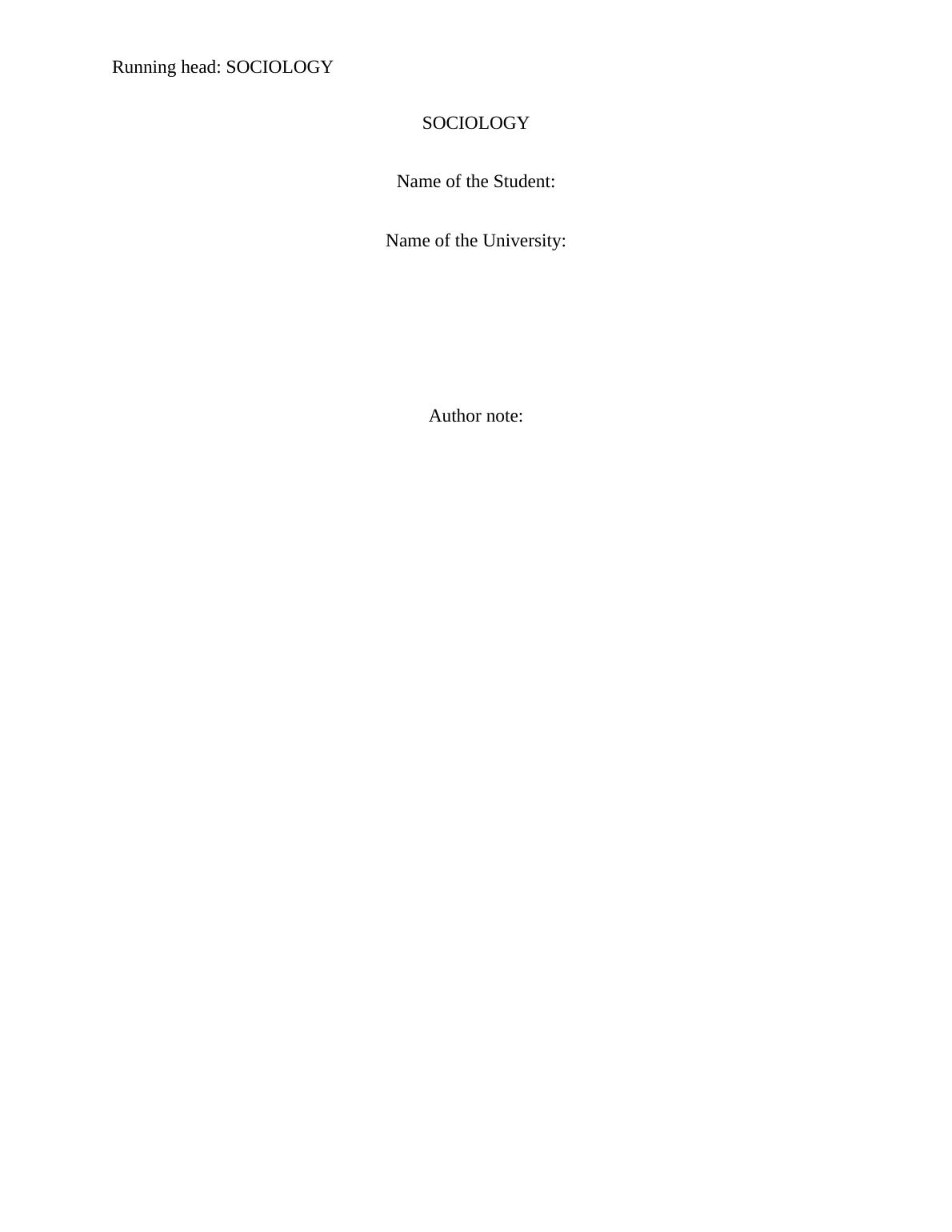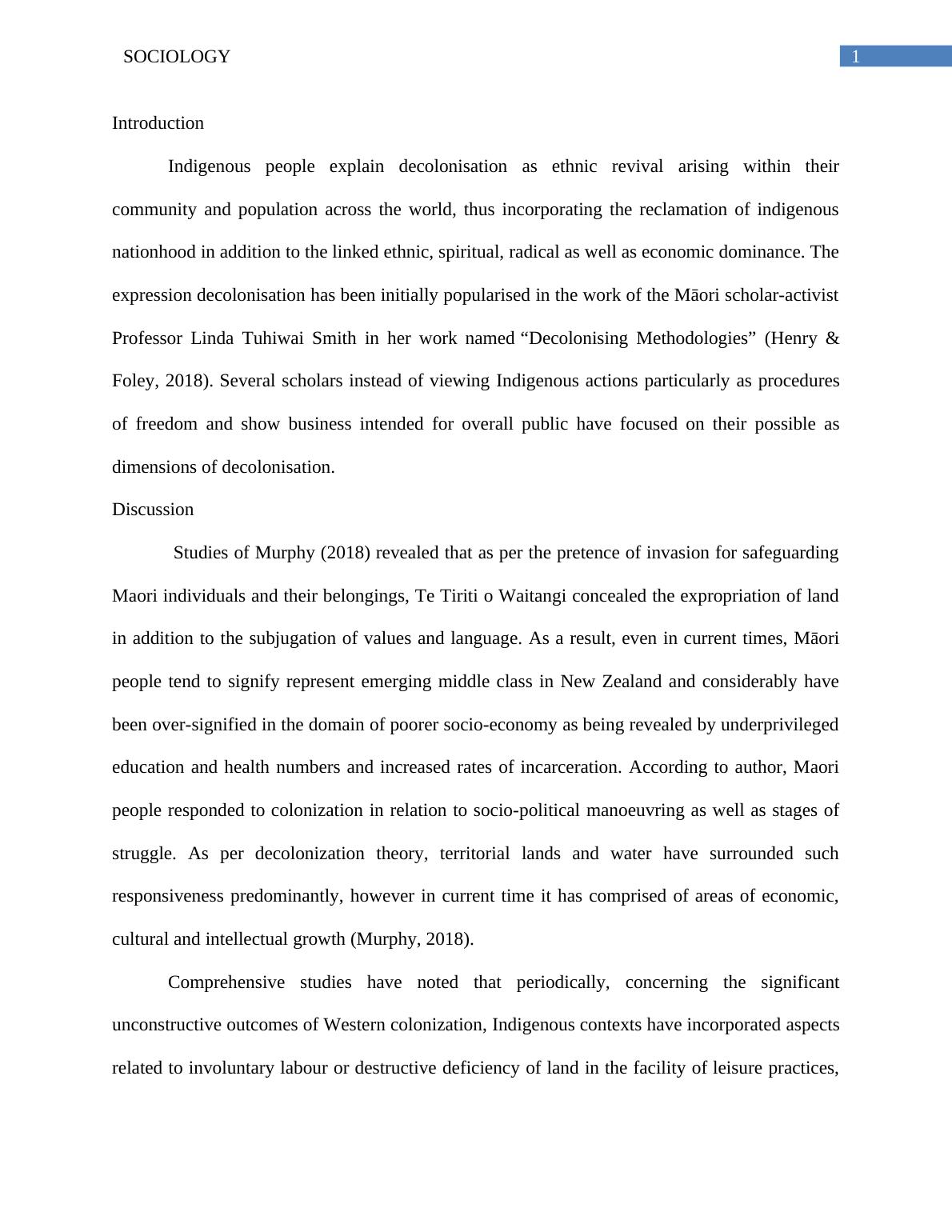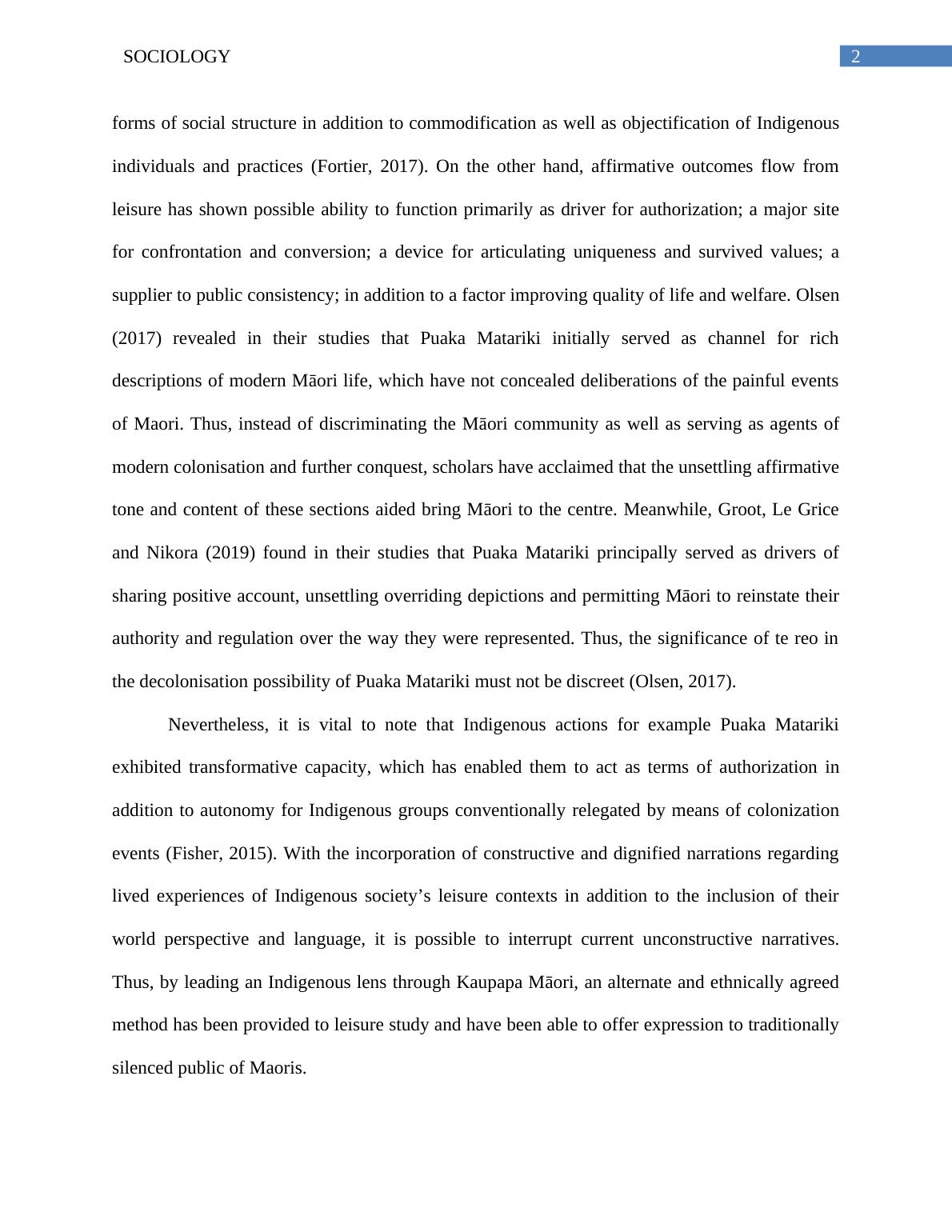Decolonisation and Indigenous Actions: A Study on the Reclamation of Indigenous Nationhood
Added on 2023-01-18
6 Pages1481 Words45 Views
Running head: SOCIOLOGY
SOCIOLOGY
Name of the Student:
Name of the University:
Author note:
SOCIOLOGY
Name of the Student:
Name of the University:
Author note:

SOCIOLOGY1
Introduction
Indigenous people explain decolonisation as ethnic revival arising within their
community and population across the world, thus incorporating the reclamation of indigenous
nationhood in addition to the linked ethnic, spiritual, radical as well as economic dominance. The
expression decolonisation has been initially popularised in the work of the Māori scholar-activist
Professor Linda Tuhiwai Smith in her work named “Decolonising Methodologies” (Henry &
Foley, 2018). Several scholars instead of viewing Indigenous actions particularly as procedures
of freedom and show business intended for overall public have focused on their possible as
dimensions of decolonisation.
Discussion
Studies of Murphy (2018) revealed that as per the pretence of invasion for safeguarding
Maori individuals and their belongings, Te Tiriti o Waitangi concealed the expropriation of land
in addition to the subjugation of values and language. As a result, even in current times, Māori
people tend to signify represent emerging middle class in New Zealand and considerably have
been over-signified in the domain of poorer socio-economy as being revealed by underprivileged
education and health numbers and increased rates of incarceration. According to author, Maori
people responded to colonization in relation to socio-political manoeuvring as well as stages of
struggle. As per decolonization theory, territorial lands and water have surrounded such
responsiveness predominantly, however in current time it has comprised of areas of economic,
cultural and intellectual growth (Murphy, 2018).
Comprehensive studies have noted that periodically, concerning the significant
unconstructive outcomes of Western colonization, Indigenous contexts have incorporated aspects
related to involuntary labour or destructive deficiency of land in the facility of leisure practices,
Introduction
Indigenous people explain decolonisation as ethnic revival arising within their
community and population across the world, thus incorporating the reclamation of indigenous
nationhood in addition to the linked ethnic, spiritual, radical as well as economic dominance. The
expression decolonisation has been initially popularised in the work of the Māori scholar-activist
Professor Linda Tuhiwai Smith in her work named “Decolonising Methodologies” (Henry &
Foley, 2018). Several scholars instead of viewing Indigenous actions particularly as procedures
of freedom and show business intended for overall public have focused on their possible as
dimensions of decolonisation.
Discussion
Studies of Murphy (2018) revealed that as per the pretence of invasion for safeguarding
Maori individuals and their belongings, Te Tiriti o Waitangi concealed the expropriation of land
in addition to the subjugation of values and language. As a result, even in current times, Māori
people tend to signify represent emerging middle class in New Zealand and considerably have
been over-signified in the domain of poorer socio-economy as being revealed by underprivileged
education and health numbers and increased rates of incarceration. According to author, Maori
people responded to colonization in relation to socio-political manoeuvring as well as stages of
struggle. As per decolonization theory, territorial lands and water have surrounded such
responsiveness predominantly, however in current time it has comprised of areas of economic,
cultural and intellectual growth (Murphy, 2018).
Comprehensive studies have noted that periodically, concerning the significant
unconstructive outcomes of Western colonization, Indigenous contexts have incorporated aspects
related to involuntary labour or destructive deficiency of land in the facility of leisure practices,

SOCIOLOGY2
forms of social structure in addition to commodification as well as objectification of Indigenous
individuals and practices (Fortier, 2017). On the other hand, affirmative outcomes flow from
leisure has shown possible ability to function primarily as driver for authorization; a major site
for confrontation and conversion; a device for articulating uniqueness and survived values; a
supplier to public consistency; in addition to a factor improving quality of life and welfare. Olsen
(2017) revealed in their studies that Puaka Matariki initially served as channel for rich
descriptions of modern Māori life, which have not concealed deliberations of the painful events
of Maori. Thus, instead of discriminating the Māori community as well as serving as agents of
modern colonisation and further conquest, scholars have acclaimed that the unsettling affirmative
tone and content of these sections aided bring Māori to the centre. Meanwhile, Groot, Le Grice
and Nikora (2019) found in their studies that Puaka Matariki principally served as drivers of
sharing positive account, unsettling overriding depictions and permitting Māori to reinstate their
authority and regulation over the way they were represented. Thus, the significance of te reo in
the decolonisation possibility of Puaka Matariki must not be discreet (Olsen, 2017).
Nevertheless, it is vital to note that Indigenous actions for example Puaka Matariki
exhibited transformative capacity, which has enabled them to act as terms of authorization in
addition to autonomy for Indigenous groups conventionally relegated by means of colonization
events (Fisher, 2015). With the incorporation of constructive and dignified narrations regarding
lived experiences of Indigenous society’s leisure contexts in addition to the inclusion of their
world perspective and language, it is possible to interrupt current unconstructive narratives.
Thus, by leading an Indigenous lens through Kaupapa Māori, an alternate and ethnically agreed
method has been provided to leisure study and have been able to offer expression to traditionally
silenced public of Maoris.
forms of social structure in addition to commodification as well as objectification of Indigenous
individuals and practices (Fortier, 2017). On the other hand, affirmative outcomes flow from
leisure has shown possible ability to function primarily as driver for authorization; a major site
for confrontation and conversion; a device for articulating uniqueness and survived values; a
supplier to public consistency; in addition to a factor improving quality of life and welfare. Olsen
(2017) revealed in their studies that Puaka Matariki initially served as channel for rich
descriptions of modern Māori life, which have not concealed deliberations of the painful events
of Maori. Thus, instead of discriminating the Māori community as well as serving as agents of
modern colonisation and further conquest, scholars have acclaimed that the unsettling affirmative
tone and content of these sections aided bring Māori to the centre. Meanwhile, Groot, Le Grice
and Nikora (2019) found in their studies that Puaka Matariki principally served as drivers of
sharing positive account, unsettling overriding depictions and permitting Māori to reinstate their
authority and regulation over the way they were represented. Thus, the significance of te reo in
the decolonisation possibility of Puaka Matariki must not be discreet (Olsen, 2017).
Nevertheless, it is vital to note that Indigenous actions for example Puaka Matariki
exhibited transformative capacity, which has enabled them to act as terms of authorization in
addition to autonomy for Indigenous groups conventionally relegated by means of colonization
events (Fisher, 2015). With the incorporation of constructive and dignified narrations regarding
lived experiences of Indigenous society’s leisure contexts in addition to the inclusion of their
world perspective and language, it is possible to interrupt current unconstructive narratives.
Thus, by leading an Indigenous lens through Kaupapa Māori, an alternate and ethnically agreed
method has been provided to leisure study and have been able to offer expression to traditionally
silenced public of Maoris.

End of preview
Want to access all the pages? Upload your documents or become a member.
